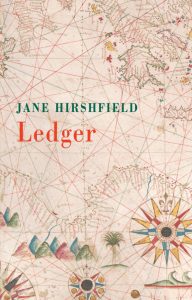Ledger
How came separation to chisel,
to cherish, to chafe?
(‘Some Questions’)
There’s always that danger in knowing a writer’s backstory, being aware of historical contexts, or as here, when we live through extreme times and cannot help but use that lens as we read. Over-reading and filtering poems through the reader’s experiences are rightly criticised. Yet, there is a line, and sometimes we may be forgiven for crossing it. Every poem offers a contact between writer and reader, and is its own entity, never entirely owned by either party. If this is an apology, I hope you can accept it and travel with it. Reviewing in this pandemic and lockdown, it is impossible not to read Jane Hirshfield’s extraordinary new collection as eerily prescient and a particularly relevant gift to these times. Immediately, and with immediacy, the opening lines set out the problem:
Let them not say: we did not see it.
We saw.Let them not say: we did not hear it.
We heard.
(‘Let Them Not Say’)
Five years on from The Beauty, this contemplative work at least equals its illustrious predecessor. These are growing moments of observation, which in a lesser writer might be slight glimpses, but here have the meditative quality of mindfulness, where the space, shape, the questioning qualities build with the incantatory, but subtle use of repetition to create something much greater. There is a percussive musicality in the poet’s handling of commonplace words and innovative ways with well-used literary devices, which lifts her lines high. Consider ‘A Bucket Forgets Its Water’:
how their single seam is as thin of rib as a donkey’s.
[…]
step stool, tool shelf, drum stand, small table for lunch.
In that stilled study, which echoes much in haiku and other Japanese forms, there is great room for breath and placing, and the unknown, and the often unknowable, is given great agency.
How close to human
must the breathed-in air come
before it develops a sense of shame or humor?
(‘Falcon’)
This is not a book for casual dipping in the first reading, although, later there will doubtless be a return to known lines. Written as a ledger, it requires to be read as such, in order to watch how it develops and unfolds. Sometimes there are aspects of Hirshfield’s reflexiveness, which can recall Seamus Heaney or even Norman MacCaig, and ‘Advice to Myself’ also has a moment of Dante, perhaps. In ‘Words’ there is also something witty, and worth comparing with Don Paterson’s thinking in The Poem: Lyric, Sign, Metre, ”Whatever they name they take the side of’.
However, the very sure current wonders not simply what it is to be human, but perhaps what it is to be anything at all, and tugs towards something even if it does not immediately dare to name it a “soul”. Following this Ledger, the reader will certainly wonder on these Japanese aspects, and about those big questions on the soul rather before the writer displays them in more open terms. Everything in the poems, their sequencing and the layout, including the judicious use of unprinted pages guides the reader to these places of quiet assurance and concern
about loneliness and separateness and what
it is lives outside one person’s skin and inside another’s.
(‘In Ulvik’)
The ‘Spell to be Said Against Hatred’, with its wonderfully quirky litany of literary repetitions is perhaps particularly timeous reading for these difficult times, whilst
Comes a time they have decided who you are.
But you have not decided who you are
(‘They Have Decided’)
seems a keynote declaration and has many portents so pertinent to this strange spring of 2020.
The final, unlocking sequence of surprise, assimilating the already well-contemplated, is rich in self-examination, confession and apology. Most of all, thankfully, it offers us hope. In the titular poem,
‘What we care about most we call beyond measure’.
Ledger is an essential collection for our times, and beyond.


Leave a Reply